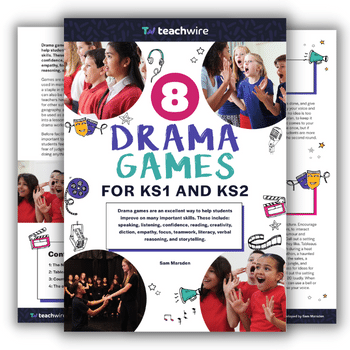Drama games – Help SEND pupils explore what makes them unique

Use these drama games to encourage your children with SEND to expand and explore what makes them unique, rather than shrinking to fit a non-existent ‘norm’…

While working as a drama teacher, I’ve seen many SEND students engage with the subject enthusiastically – especially drama games – even surprising those who know them.
Once, while working in a special school, I saw a non-verbal student speak for the first time ever!
In class, we had been working with the picturebook Handa’s Surprise for about four weeks, exploring the story with drama games, instruments, words, and movement, and often having great fun pretending to be the animals from the book.
One week, I turned the page of the book, and a normally non-verbal student said, “monkey” while pointing to the monkey taking the banana from Handa’s basket!
Their TA and I were stunned (and a little emotional). Other pupils, teachers, and parents were delighted.
From then on, the child became verbal in other areas of their life too.
They probably would have become verbal without drama, but I think our activities might have sped the process up, and others thought so too.
This pupil loved drama games, participating, and opening up in class more so than they did in other subjects.
Drama can be an experimental, playful, and creative space, where mistakes are not only allowed, but encouraged.
This can be particularly liberating for SEND students.
Drama for acceptance
Too often, SEND pupils are required to shrink themselves to fit in. But drama is a place that allows them to expand and express themselves.
Things I will often be found saying in the drama class are: “There is no wrong way”, “Don’t worry about what others think”, and “Do the first thing that comes into your head”.
However, not all drama activities are helpful. There are some harmful drama games out there that can panic children and make them feel rejected.
When choosing content, I recommend making sure you choose games and activities that bring the class together. Avoid drama games that have winners and losers.
Drama for focus
I’ve seen children who usually struggle with focus pay attention well in the drama classroom.
Pupils with ADHD can find drama practically engaging.
A well-planned drama lesson should be fast-paced, and engage students physically, vocally, creatively, and mentally.
When performing a live improvisation in front of the class, there is no room for your attention to drift!
There are many drama activities to help students slow down and focus, too, such as relaxation exercises to music, Stanislavski’s circles of attention, Lee Strasberg’s imaginary object exercise, and counting to 20 as a group.
For counting to 20 as a group, each number is said by one person at random. If two people say the number at the same time, the group go back to number one.
It’s a great activity to calm the energy and bring the class back to focusing on a common goal.
Drama for inclusivity
When taught well, drama is a subject that offers a safe space to express creativity, to work in teams, all while increasing confidence. But when taught badly, it can further exclude.
‘Yes, lets’ is one of my favourite warm-up games, as everyone’s ideas are welcomed and executed.
This involves proposing an idea to be mimed, and a positive response (think improv basics). For example, you might say, “Let’s all read a book” and everyone shouts, “Yes, lets” – at which point you all mime reading a book.
You might continue, “Let’s all ride a unicorn”. Pupils reply “Yes, lets”, and you all mime riding a unicorn.
After you give a few examples, and when the game is in full swing, ask students to put their hands up if they have an idea.
Explain that all ideas, except for violent ones, are welcome. Try and give as many pupils as possible a go, and encourage (but don’t force), reluctant children to offer an idea.
Dyslexia and drama
Drama can be very empowering for students with dyslexia. I have dyslexia and for a long time, drama was the only subject I was good at.
It was a place I didn’t have to worry about words, or numbers, or remembering information. I could use my imagination, and verbal reasoning skills, which were my strengths. It was one of the few practical subjects where I could get up on my feet and do.
I’m not alone as I’ve taught dozens of students with dyslexia since, who also love drama as it’s a subject where they get to use their strengths and forget about their weaknesses.
Try different explanations
People receive information in different ways, and for inclusivity, I believe it’s important for the teacher to communicate using several methods.
I often explain an activity in two different ways, or sometimes three, always using words, tone of voice, movement, and facial expressions to communicate.
Because for some children, visual signals can really help them.
For example, if I have a SEND student in the class who responds well to pictures, I will make sure to include visuals in my explanations for the whole class.
If I ask the class to imagine it’s snowing, for instance, I will pretend to be very cold, and may even hold up a picture of snow.
I am likely also to play a piece of music that sounds snowy too, so that pupils have audio and visual guides to improvise with as they go on their snowy adventure.
How to deal with overwhelm
If a pupil becomes overwhelmed, try and keep the class energy calm. Some focus drama games, breathing exercises, or mindfulness activities might help to bring down the energy of the group.
Offer the overwhelmed student a quiet place to sit, and explain that they may watch and join in when they are ready.
If the class is independently rehearsing short scenes or improvisations, some SEND students might benefit from rehearsing in a quiet space, away from the rest of the class. This can prevent other children practising becoming a distraction, or being too overwhelming for them.
5 steps to successful drama lessons
- Outline the content of the class at the start of the lesson to help SEND pupils who respond well to structure. Many children with SEND find it comforting to know what to expect. If possible, write this on a board to help anchor these pupils.
- No idea is too silly in drama. Encourage and praise pupils when they share their creativity.
- One way to start the class is to get children into a circle and then ask them to do a vocal warm-up. For example, ask them to moo, meow, or woof to the tune of ‘Twinkle, twinkle little star’. Or you can do some tongue twisters, or funny sounds, all together.
- Follow this up with a quick movement warm up. For example, ask the class to imagine chewing on a big toffee, or biting into a rotten apple, or that they are a tiny seed growing into a beautiful flower, slowly.
- For inclusivity, never tolerate any unkind comments, looks, gestures, or laughs. If this happens, take the offending pupil aside and explain kindness and acceptance are essential in drama. If this doesn’t improve the behaviour, you may need to remove them from the group temporarily.
Sam is a former drama teacher at schools and Youth Theatres. She is the author of 100 Acting Exercises for 8–18-Year-Olds, published by Bloomsbury.











